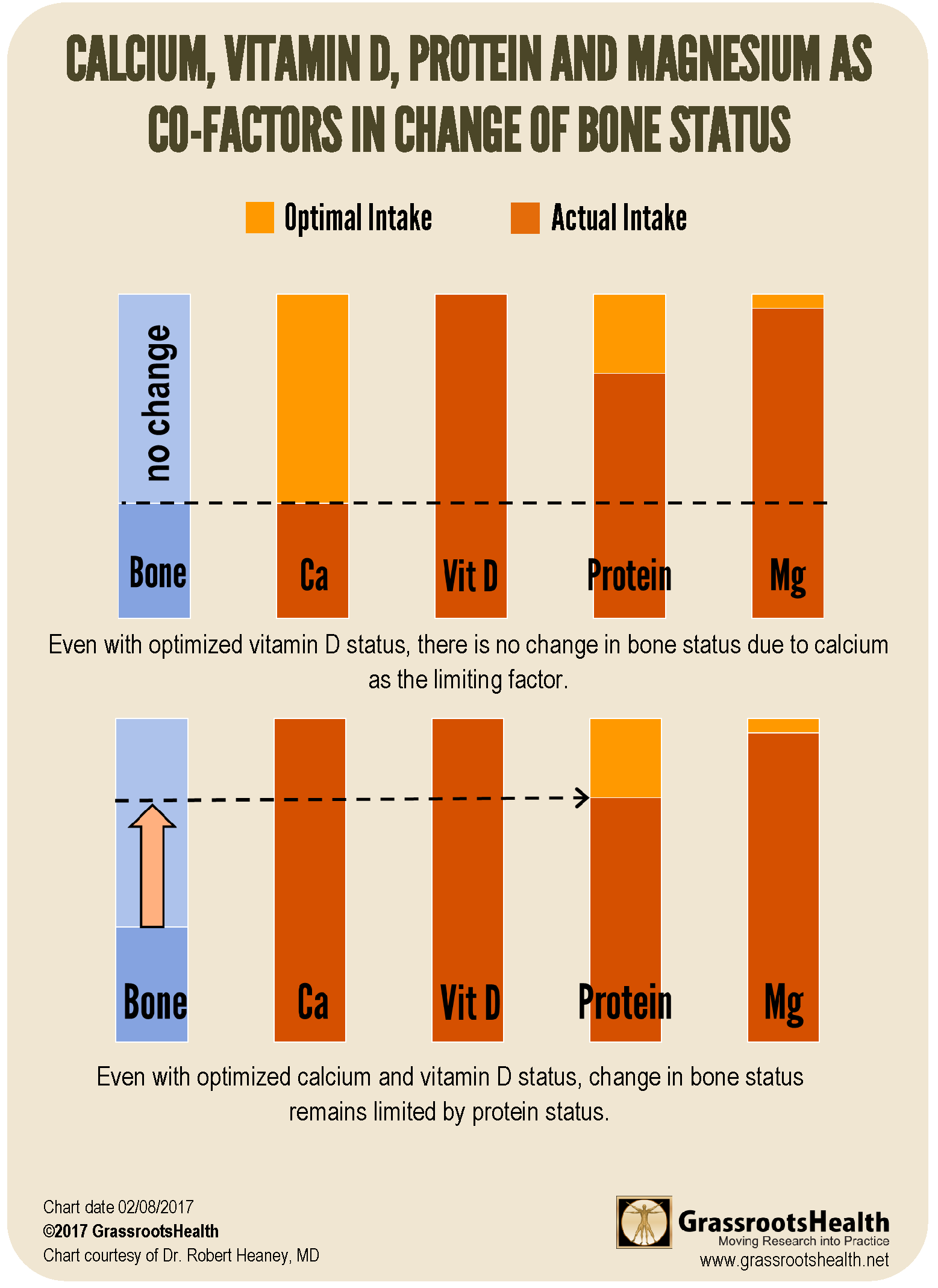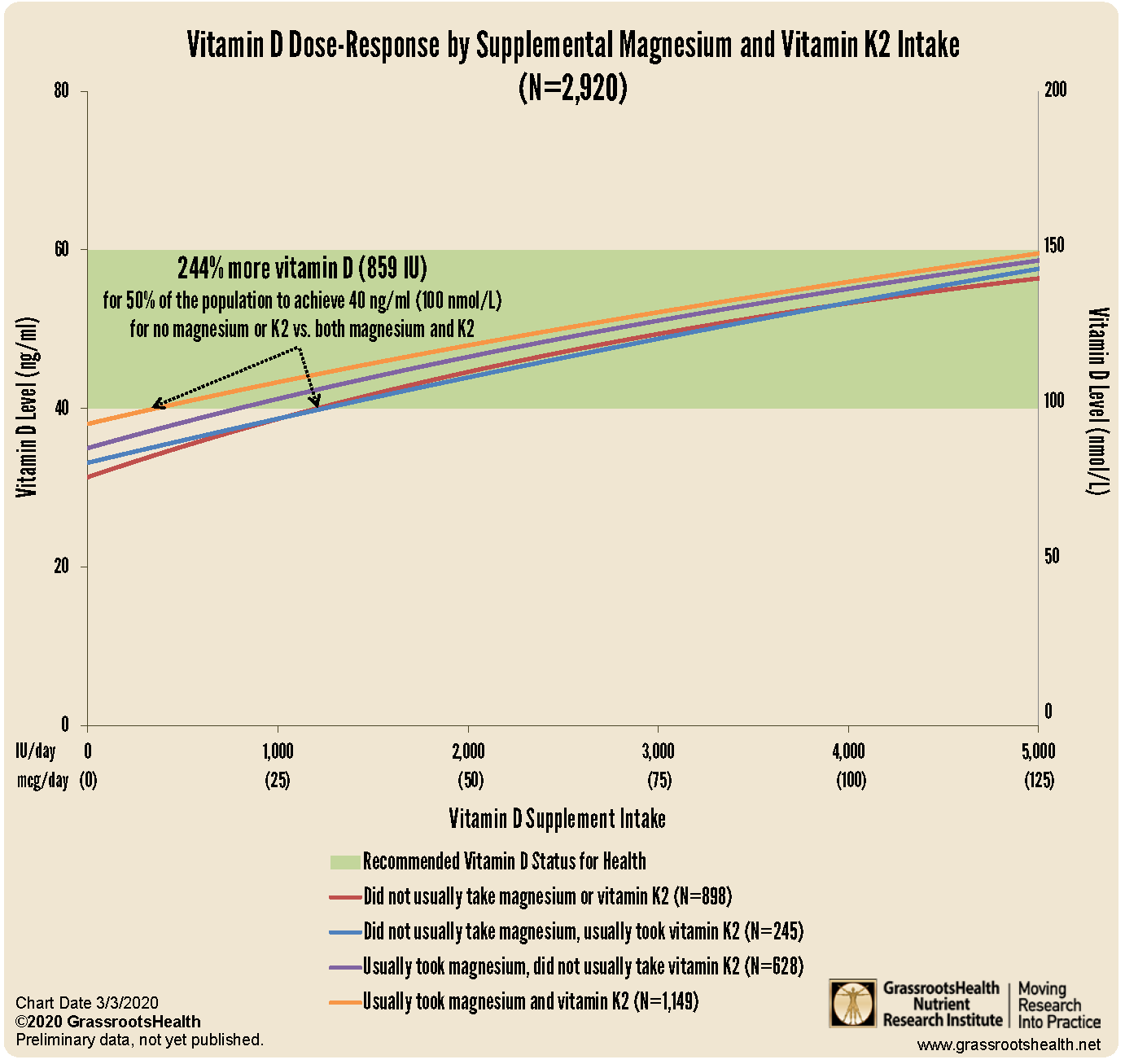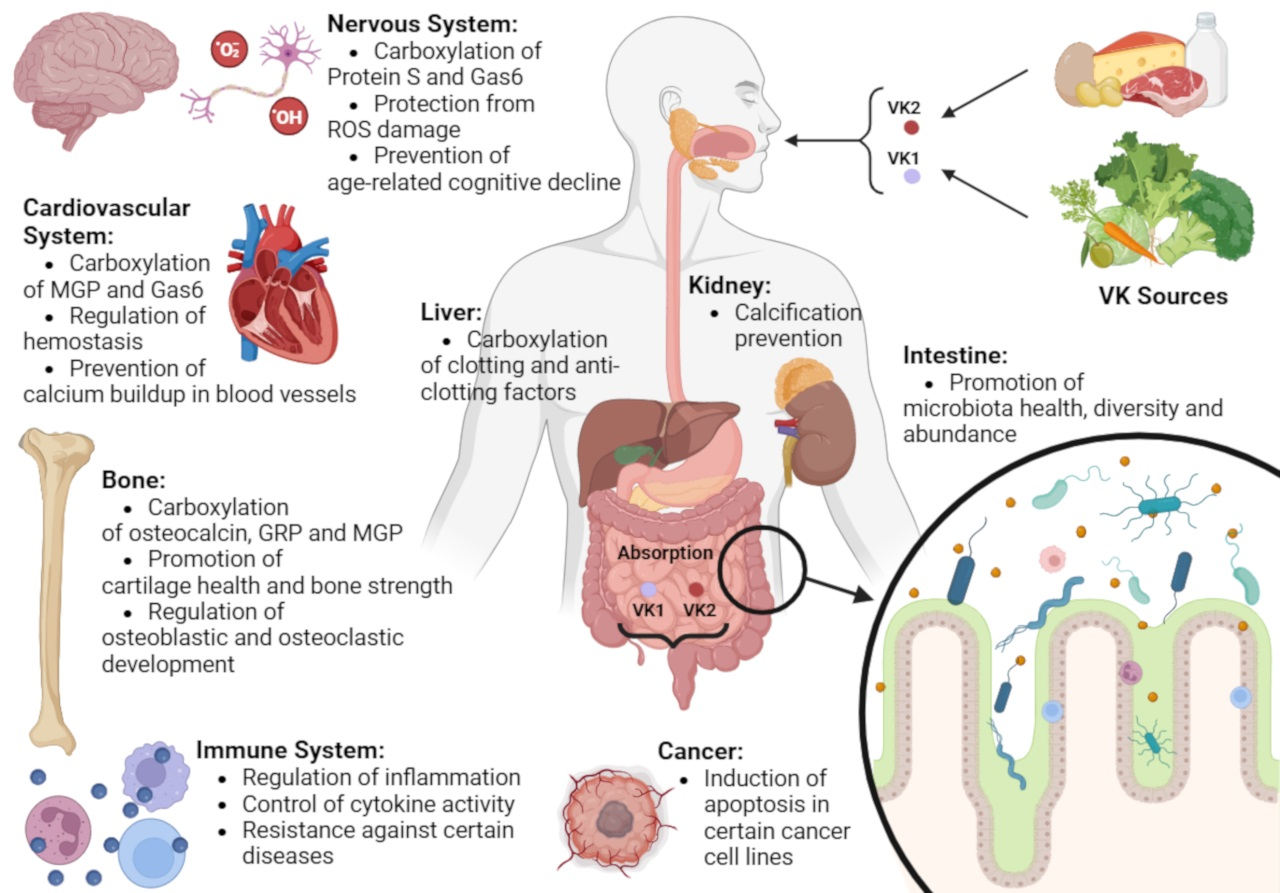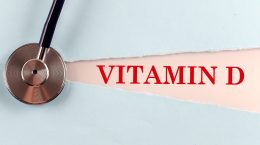Published on October 17, 2024
Answers to your questions about vitamins D and K submitted during the virtual forum, along with an overview of the health benefits of vitamin K and whether supplementation is necessary.
Key Points
- While there are many key nutrients that work along with vitamin D, magnesium and vitamin K2 have come to the forefront as two of the most important vitamin D co-nutrients
- An analysis of GrassrootsHealth participant data showed that supplementing with vitamin K2 increased the vitamin D dose response on average; in other words, less vitamin D was needed to achieve a 25(OH)D serum level of 40 ng/ml (100 nmol/L) or greater when also supplementing with vitamin K2
- Vitamin K works synergistically with vitamin D to optimize several processes within these body systems, and therefore adequate amounts of both vitamin D and vitamin K2 are required for maximum effect
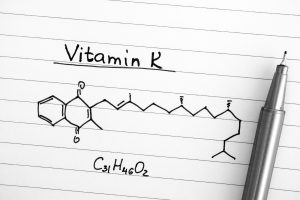 There is a lot of recent research and conversation around the relationship between vitamin D and vitamin K; in fact, it was the most common topic among the questions submitted to our recent live forum. While there are many key nutrients that work along with vitamin D, magnesium and vitamin K2 are two of the most important vitamin D co-nutrients.
There is a lot of recent research and conversation around the relationship between vitamin D and vitamin K; in fact, it was the most common topic among the questions submitted to our recent live forum. While there are many key nutrients that work along with vitamin D, magnesium and vitamin K2 are two of the most important vitamin D co-nutrients.
Today, we will address questions asked about vitamin K2 specifically. First, let’s be sure to understand how co-nutrients work together for a specific process, and take a look at one clear example of how vitamin K2 supplementation can have an effect on the vitamin D dose-response.
How Co-Nutrients Work Together for Optimal Health Outcomes
Co-nutrients are nutrients that work together for some process within the body. If one co-nutrient is limited, either missing or not plentiful enough, then the process might also be limited. In the following chart, Dr. Robert Heaney used bone status as an example, showing calcium, vitamin D, protein, and magnesium as just a few of the co-factors working together to maintain strong and healthy bones.
In the chart above, each nutrient is at optimal status when its bar is full (dark orange). When any or all nutrients are below the optimal level (leaving the lighter orange showing), bone status is impaired at the level of the lowest, or most limited, nutrient. If one were to focus on optimizing vitamin D, without also optimizing calcium, protein, and magnesium (such as in the top chart), no change in bone status would be observed, leading to a false conclusion that vitamin D does not affect bone status. Even if calcium and vitamin D status are optimized, as shown in the bottom chart, bone status would improve but would still be limited by the protein status. Because the nutrients interact in the maintenance of bone health, the effects of a single nutrient may be overlooked if intake of others is not sufficient.
NOTE: Many other nutrients important for bone health are not shown in the charts above, including vitamin K.
Supplemental Vitamin K2 Intake Affects the Vitamin D Dose-Response
Some nutrients seem to have a direct influence on vitamin D levels, as can be seen in a previous analysis on how supplementing with certain nutrients and other factors can influence the vitamin D dose-response.
The chart above shows how supplemental vitamin K2 and magnesium intake affected the vitamin D levels of GrassrootsHealth participants. Using the data provided for the vitamin D*action study from almost 3,000 participants with supplemental magnesium and vitamin K2 information, we plotted every participant’s supplemental vitamin D intake (dose) and blood level (response) and determined the average trends for participants who reported taking no supplemental magnesium or vitamin K2, those who reported usually taking both supplemental magnesium and vitamin K2, and those who reported taking only one or the other.
What we found was, on average, those taking both supplemental magnesium and vitamin K2 have a higher vitamin D level for any given vitamin D intake amount than those taking either supplemental magnesium or vitamin K2 or neither. Specifically, 244% more supplemental vitamin D was needed for 50% of the population to achieve 40 ng/ml (100 nmol/L) for those not taking supplemental magnesium or vitamin K2 compared to those who usually took both supplemental magnesium and vitamin K2.
Those taking supplemental vitamin K2 without magnesium also had a higher vitamin D level for any given vitamin D intake amount than those not taking supplemental vitamin K2, on average. Specifically, 115% more supplemental vitamin D was needed for 50% of the population to achieve 40 ng/ml (100 nmol/L) for those not taking supplemental vitamin K2 compared to those who took 200 mcg/day or more. The trend lines for both supplemental vitamin K2 intake amounts (1-199 and 200+ mcg/day) were similar.
In summary, supplementing with vitamin K2 seems to increase the vitamin D dose response; in other words, less vitamin D was needed to achieve a 25(OH)D serum level of 40 ng/ml or greater when also supplementing with vitamin K2.
Synergistic Effects of Vitamins D and K2 within the Body
Vitamin K is important for promoting brain, cardiovascular, bone, and immune health, among others, as illustrated in the graphic below by Sadler et al..
Vitamin K works synergistically with vitamin D to optimize several processes within these body systems, and therefore adequate amounts of both vitamin D and vitamin K2 are required for maximum effect. Examples of the synergistic effects of vitamins D and K2 are listed below, as compiled by Dr. Richard Cheng in a recent article (with references) here.
- Bone Health: Vitamin D is crucial for calcium absorption, while vitamin K2 directs calcium to the bones and helps prevent its deposition in arteries. Studies have shown that combined supplementation of vitamins D3 and K2 can lead to significant improvements in bone mineral density (BMD) and a decreased risk of osteoporosis. This synergistic effect is thought to be due to vitamin K2’s role in activating proteins that are essential for bone formation and mineralization, such as osteocalcin, which requires vitamin K for its activation (62-64).
- Insulin Sensitivity: Supplementation with vitamin K2 has been associated with improved insulin sensitivity, particularly in individuals with type 2 diabetes. Research indicates that vitamin K2 can reduce insulin resistance, as evidenced by decreased HOMA-IR values in patients receiving vitamin K2 supplementation. This suggests that vitamin K2 may play a role in enhancing the metabolic effects of vitamin D, thereby improving glucose metabolism and potentially reducing the risk of diabetes-related complications (65).
- Cardiovascular Health: The combination of vitamins D and K2 may also benefit cardiovascular health by preventing arterial calcification. Vitamin K2 activates matrix GLA protein (MGP), which inhibits the calcification of arteries. This protective effect is particularly important as vitamin D alone may not provide the same level of protection against arterial calcification (63,64).
- Immune Function: Both vitamins are implicated in supporting immune function. Vitamin D enhances the immune response, while vitamin K2 has been shown to modulate inflammation. Together, they may help improve immune responses and reduce the risk of inflammatory diseases (63,66).
Vitamin D and Vitamin K: Questions & Answers from Our Virtual Forum
The following questions were submitted as part of our live and ongoing virtual forum.
Q: Vitamins D and K2 are often taken together because they work synergistically to support bone and cardiovascular health. Should this always be the case, and is there any scientific proof of the action of vitamin K2 that supports the claim of keeping calcium out of blood vessels?
A: While more research continues to be published about the actions of vitamin K2 (as reviewed briefly above and in a recent publication by Sadler et al. (2024), whether supplementation with vitamin K2 is necessary when supplementing with vitamin D remains a topic of debate among key scientists. Yes, vitamin K2 has many very important actions within the body that have been demonstrated scientifically, including its involvement in directing calcium from soft tissues to bone. Ensuring optimal vitamin K2 intake is necessary, however, whether increasing vitamin D intake through supplements increases the need for vitamin K2 is not yet clear.
The consensus among our experts seems to be that ensuring an adequate intake of vitamin K2, regardless of vitamin D dose, is beneficial for our health. We look forward to any additional research to further clarify this topic.
Q: Is it advised to also take vitamin K2 with vitamin D, and if so, how much K2 per 1000 IU of vitamin D? Is there a general rule of thumb for dosage proportion when supplementing with vitamins D and K2? For example, if you’re taking 5,000 IU of D3 how do you determine the proper amount of K2 (MK-7) to take?
A: There is no specific ratio for the intake of supplemental vitamin D to vitamin K2. In general, it is recommended to get enough vitamin D (through supplements, sun, and diet) that is necessary to achieve a minimum vitamin D level of 40 ng/ml (100 nmol/L) or higher, or whatever your chosen target level is.
Currently, several experts do recommend taking vitamin K2 with higher doses of vitamin D. For example, Dr. Sunil Wimalawansa recommends taking vitamin K2 (100 µg daily or 800 µg/week as MK7) when higher doses of vitamin D are taken (i.e., doses above 7,000 IU/day and 50,000 IU/week) or when a 25(OH)D serum level is 80 ng/ml or higher. While there is no specific set RDA for vitamin K2, several experts have recommended a general intake of vitamin K2 (from food and supplements) of 100-300 µg per day, regardless of vitamin D intake.
Q: There is a lot of emphasis on Vitamin D3 which is great, but where is the lecture regarding Vitamin K2-MK7?
A: GrassrootsHealth recently interviewed Dr. Niel Karrow on the topic of vitamin D and vitamin K, which can be viewed here. GrassrootsHealth has also published several blogs and featured videos about vitamin K, which can be found here.
Q: When taking vitamin D supplements, do you have to take vitamin K with it, or can you just get enough vitamin K from food?
A: The source of vitamin K2 (whether it is coming from food or supplements) is not as important as ensuring an adequate intake. It can be easy to obtain enough vitamin K2 from food alone. Vitamin K2 is found in fermented foods such as sauerkraut, natto, and kimchi, high fat dairy from grass-fed cows, eggs, and animal organs. Just as with any other nutrient, if your diet lacks sufficient amounts of vitamin K2, taking a vitamin K supplement is wise.
Q: What are your thoughts on Vitamins D3 and K2 taken regularly having any possible ill-effects on polycystic kidney disease?
A: This question was presented to our expert panel during our live forum event, which can be found here. In summary, there is no evidence that taking physiologic doses of vitamins D3 (up to 10,000 IU/day) and K2 is harmful to kidney function, including in polycystic kidney disease.
Q: Do children need to take vitamin D3 with vitamin K2 or they are fine with just D3, and at what age it is better to be considered to start taking both?
A: Vitamin D supplementation among children is safe, even without vitamin K2 supplementation. However, as mentioned above, if your diet lacks sufficient amounts of any nutrient, including vitamin K2, supplementation should be considered.
Q: Does a person who eats lots of greens (like vegans and vegetarians) need to take K2 along with D3?
A: There is evidence that vitamin K1 can be converted to the forms of vitamin K2 necessary for working synergistically with vitamin D, as discussed in this video here. Many leafy green vegetables are high in vitamin K1. It may still be necessary to add certain fermented foods and/or a supplement to ensure adequate vitamin K2 status.
Measure Your Levels of Vitamin D, Magnesium, and Other Important Nutrients and Markers
 Having and maintaining healthy vitamin D, magnesium, omega-3s, zinc and other nutrient levels can help improve your health now and for your future. Choose which to measure, such as your vitamin D, omega-3s, and essential minerals including magnesium and zinc, by creating your custom home test kit today. Take steps to improve the status of each of these measurements to benefit your overall health. You can also track your own intakes, symptoms and results to see what works best for YOU.
Having and maintaining healthy vitamin D, magnesium, omega-3s, zinc and other nutrient levels can help improve your health now and for your future. Choose which to measure, such as your vitamin D, omega-3s, and essential minerals including magnesium and zinc, by creating your custom home test kit today. Take steps to improve the status of each of these measurements to benefit your overall health. You can also track your own intakes, symptoms and results to see what works best for YOU.
Enroll and test your levels today, learn what steps to take to improve your status of vitamin D (see below) and other nutrients and blood markers, and take action! By enrolling in the GrassrootsHealth projects, you are not only contributing valuable information to everyone, you are also gaining knowledge about how you could improve your own health through measuring and tracking your nutrient status, and educating yourself on how to improve it.


